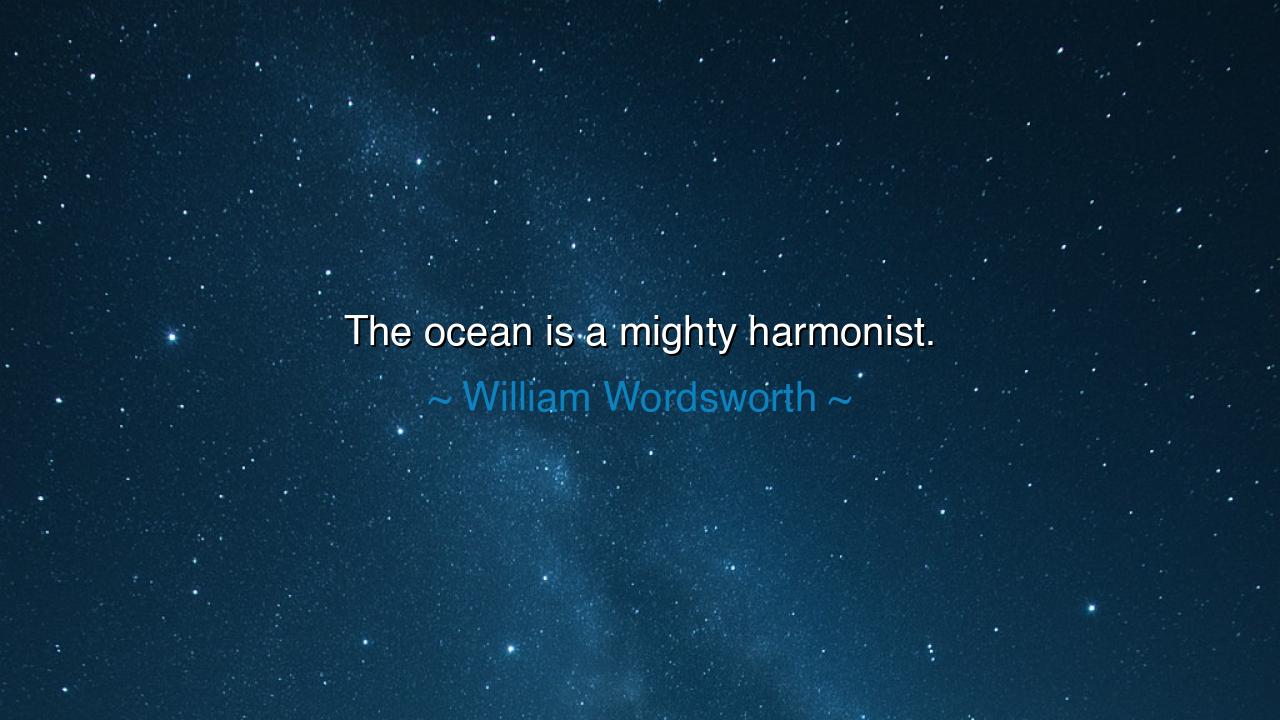
The ocean is a mighty harmonist.






William Wordsworth, the poet of nature’s spirit, once declared: “The ocean is a mighty harmonist.” In these words, he captures the eternal rhythm of the sea, a rhythm that unites chaos and calm into one vast symphony. The ocean, with its crashing waves and whispering tides, holds within it the power of both destruction and renewal. Yet for Wordsworth, it is not a wild, discordant force, but a grand musician — a harmonist whose endless music binds together the elements of the earth.
The ancients, too, revered the sea as more than water. The Greeks spoke of Poseidon, tempestuous and unpredictable, yet also necessary to the balance of the world. The Hebrews sang of the voice of many waters, a sound like the presence of the divine. The Norse told of Ægir, who brewed ale for the gods in the cauldron of the deep. In every tradition, the ocean was not silence but song — sometimes fierce, sometimes tender, always eternal. Wordsworth, standing upon the shores of his own England, perceived this truth anew: the sea does not simply roar; it conducts.
The meaning of his words is both natural and symbolic. On one level, the ocean is indeed a harmonist, blending the sounds of waves, winds, gulls, and storms into one unbroken music. On another level, it is a metaphor for life itself. For just as the ocean joins rage and calm into a single whole, so too does life weave together joy and sorrow, beginnings and endings. Harmony is not the absence of difference but the weaving together of contrasts. The sea teaches us that beauty lies not in sameness, but in the union of many voices.
History itself gives proof. When explorers first crossed the Atlantic, they heard the ocean’s voice unceasingly for months. To some, it was terror — the endless waves threatening to swallow their fragile ships. But to others, it was reassurance — a constant rhythm, steady and sure, guiding them toward new worlds. The same sea that drowned many also carried Columbus, Magellan, and countless unnamed sailors toward discovery. The ocean’s harmony is not always gentle, but it is always profound, and it has shaped the destiny of nations.
There is also a spiritual wisdom here. Wordsworth, who saw divinity in lakes, mountains, and clouds, recognized in the ocean the grandest choir of all. Its harmony is not merely sound but order — the tides governed by the moon, the currents moving in cycles that nourish the earth, the storms that clear the air and bring renewal. Even its terrors serve the balance of the world. To call the ocean a harmonist is to confess that in its depths lies the same creative order that governs the stars.
The lesson for us is this: we must learn from the ocean how to harmonize our own lives. Like the sea, we contain storms and calms, anger and peace, despair and hope. If we see them as enemies, we live divided; if we see them as parts of one great song, we find wholeness. The ocean does not silence its waves, nor does it forbid its tempests. Instead, it weaves them into the eternal rhythm of the tides. So, too, must we weave our struggles and triumphs into the harmony of our lives.
Practically, this means listening for rhythm in the midst of chaos. When life roars like a storm, remember that the ocean too can rage, and yet it remains whole. When life is calm, cherish it as one cherishes the sea’s still waters. Seek balance, not by erasing differences, but by blending them into a greater order. Let your heart become, like the ocean, a mighty harmonist, where all things — grief, joy, fear, and love — find their place in one grand song.
Thus, Wordsworth’s words endure: “The ocean is a mighty harmonist.” Take them as both poetry and wisdom. Stand before the sea, hear its endless music, and let it teach you the art of harmony. For in its voice, eternal and unbroken, lies the secret of living: not to silence the storm, but to let it join the symphony.






AAdministratorAdministrator
Welcome, honored guests. Please leave a comment, we will respond soon